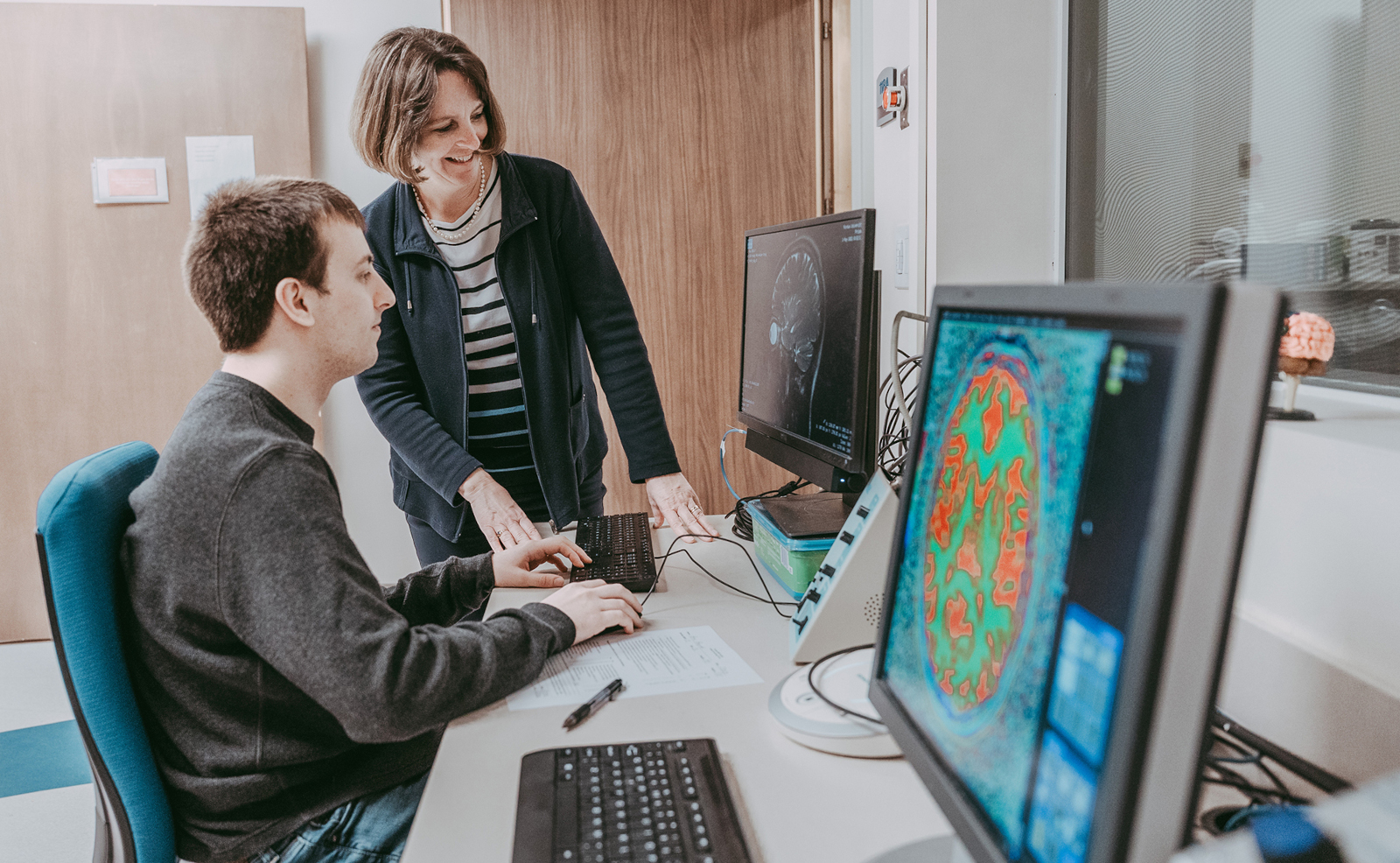Scientific Programs
Structured for discovery
PICR facilitates basic discovery and advances cutting-edge technologies and medicines to detect, prevent and treat cancer by integrating and channeling the scientific strengths of Purdue University across foundational disciplines, including biochemistry, biological sciences, chemistry, computational sciences, engineering, medicinal chemistry, nutrition science, pharmacy, physical sciences, structural biology and veterinary medicine. These disciplines are organized into three synergistic research programs.
Each program promotes collaboration among investigators with complementary expertise, enabling research that deepens our understanding of cancer mechanisms and supports the development of novel therapeutic strategies.
The Cell Identity and Signaling (CIS) Program is committed to advancing the discovery of novel molecular mechanisms that govern cell identity and fundamental cellular processes, focusing on their roles in cancer development and preclinical therapeutic targeting.
Cancer cells exploit normal cellular processes—such as growth, differentiation, and embryogenesis—through genetic and epigenetic alterations. To develop effective interventions, CIS aims to characterize these molecular mechanisms and understand how their dysregulation contributes to aberrant cellular behaviors, including tumor growth, immune evasion, metastasis, therapy resistance, and recurrence. The program is dedicated to identifying impactful cellular processes and mechanism-based therapeutic targets to drive innovative cancer therapies.
The Purdue Institute for Cancer Research also inspires the continuing development of scientific leaders in cancer research through innovative training and mentoring.
Program co-leaders:
- Matthew Olson (Biological Sciences)
- Majid Kazemian (Biochemistry and Computer Science)
Co-leader in training:
- Brittany Allen-Petersen (Biological Sciences)
The Targets, Structures and Drugs (TSD) Program accelerates the discovery, development, and evaluation of small molecule agents and biologics with anti-cancer potential through inter- and intra-programmatic collaboration reinforced by faculty with broad expertise in cancer research and the drug development process. This is accomplished through world-class expertise in synthetic chemistry, determining how molecular building blocks work, creation of targeted agents, screens to identify new cancer targets, identifying new therapeutic drugs for preclinical testing, and evaluation of new therapeutic approaches in natural occurring canine tumor models more reflective of the human condition.
Alongside supporting this virtual pipeline, TSD focuses its collective effort into (1) expanding and diversifying cancer drug discovery; (2) enhancing molecular-level understanding of cancer biology and mechanisms; (3) creating and validating novel computational tools integrating artificial intelligence (AI), machine learning (ML), and in silico modeling for drug discovery; (4) accelerating therapeutics towards clinical application. The Purdue Institute for Cancer Research also inspires the continuing development of scientific leaders in cancer research through innovative training, education and mentoring.
The TSD program membership is broken into three subgroups:
- Chemical & Structural Biology
- Medicinal Chemistry
- Target Validation
Program co-leaders:
- Deborah Knapp (Veterinary Clinical Sciences)
- Emily Dykhuizen (Medicinal Chemistry and Molecular Pharmacology)
- John Tesmer (Biological Sciences)
Co-leader in training:
- Shawna Klahn (Veterinary Clinical Sciences)
The mission of the Drug Delivery and Molecular Sensing (DDMS) Program is to provide physical science/engineering and technology solutions to advance the understanding of cancer biology, and to improve prevention, detection and treatment of cancers, fulfilling PICR’s strategic goal of enhancing cancer treatment and diagnosis.
The DDMS program offers physical science/engineering and technology solutions based on collaborations among investigators at the forefront of physics, chemistry, pharmacy and engineering disciplines which are major strengths at Purdue University and contribute to the PICR Foundational Disciplines. Innovative cancer solutions from the DDMS program include molecular conjugates and nanoparticles for targeted drug/gene delivery, engineered immune cells for cancer immunotherapy, new imaging modalities for surgical guidance and detection of drug targets and responses, and new in vitro tumor models to study cancer biology that can be applied to basic discoveries and translational efforts in cancer research. The Purdue Institute for Cancer Research also inspires the continuing development of scientific leaders in cancer research through innovative training, education, and mentoring.
The Purdue Institute for Cancer Research also inspires the continuing development of scientific leaders in cancer research through innovative training, education, and mentoring.
Program co-leaders:
- Yoon Yeo (Industrial and Molecular Pharmaceutics)
- Fang Huang (Biomedical Engineering)

Collaborative, cancer-fighting investigators
Together, our investigators form an integrated research community that advances the core scientific priorities of PICR. Browse the full roster of cancer researchers whose work anchors PICR’s programmatic research enterprise.
Contact Us
Get in touch
Phone: 765-494-9129
Fax: 765-494-9193
Email: cancerresearch@purdue.edu
Meet our team
Find us
201 S. University St.
Hansen Life Sciences Bldg, Rm. 141
West Lafayette, IN 47907